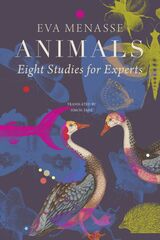16 books about Shapiro, Alan
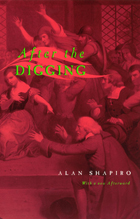
After the Digging
Alan Shapiro
University of Chicago Press, 1998
After the Digging provides an exceptional look at the early work of acclaimed poet Alan Shapiro. His first collection of poems allows readers to realize his strong sense of historical narrative and gives them reference on how to read his later poems. Inspired by his time at Stanford in the late seventies, the book is divided into two parts: the first is a sequence on the Irish Famine in the mid-nineteenth century; the second, a series on demonic possession in late seventeenth-century New England. These poems give voice to the pain and delusion of those from other periods and inevitably recall the many evils of our own century.
"Powerful. . . . That a young poet can handle this subject so well in a first book is . . . a pleasure in itself."—Robert von Hallberg, Contemporary Literature, 1981
"Powerful. . . . That a young poet can handle this subject so well in a first book is . . . a pleasure in itself."—Robert von Hallberg, Contemporary Literature, 1981
[more]
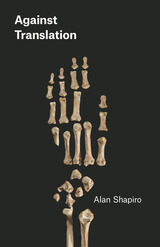
Against Translation
Alan Shapiro
University of Chicago Press, 2019
We often ask ourselves what gets lost in translation—not just between languages, but in the everyday trade-offs between what we experience and what we are able to say about it. But the visionary poems of this collection invite us to consider: what is loss, in translation? Writing at the limits of language—where “the signs loosen, fray, and drift”—Alan Shapiro probes the startling complexity of how we confront absence and the ephemeral, the heartbreak of what once wasn’t yet and now is no longer, of what (like racial prejudice and historical atrocity) is omnipresent and elusive. Through poems that are fine-grained and often quiet, Shapiro tells of subtle bereavements: a young boy is shamed for the first time for looking “girly”; an ailing old man struggles to visit his wife in a nursing home; or a woman dying of cancer watches her friends enjoy themselves in her absence. Throughout, this collection traverses rather than condemns the imperfect language of loss—moving against the current in the direction of the utterly ineffable.
[more]
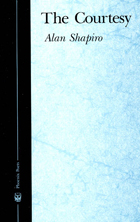
The Courtesy
Alan Shapiro
University of Chicago Press, 1983
In this, his first book, Alan Shapiro vividly recreates some of the more memorable and poignant moments from his Jewish-American childhood, and in the process reveals his compassionate interest in the forgotten, the alienated, and the infirm. The Courtesy is an intelligent, reflective examination of the poet's own psychological history.
"The Courtesy is really an admirable book: it shows up the unreality of a lot of the other poetry one reads, dealing honestly and with that perversity which is a sign of thoughfulness, with the slight but heavy matter of our everyday defeats."—Michael Hoffman, Poetry Nation Review
"The Courtesy is really an admirable book: it shows up the unreality of a lot of the other poetry one reads, dealing honestly and with that perversity which is a sign of thoughfulness, with the slight but heavy matter of our everyday defeats."—Michael Hoffman, Poetry Nation Review
[more]
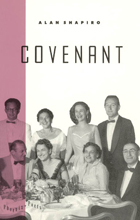
Covenant
Alan Shapiro
University of Chicago Press, 1991
"The coherence Shapiro prizes is both more thorough and more thoroughgoing than that offered by a moralizing intelligence. His poetry comes by its sad wisdom through its accomodations to human happenstance and estrangement. . . .In Covenant, sympathy grounds itself in worldly particulars, and subjectivity begets responsibilities. Hardnosed yet tenderly attentive, Shapiro's acute self-consciousness distills an exacting conscientiousness."—David Barber, Poetry
"At forty-years-old and already the author of four superbly written books of poems, Shapiro has produced a work of such authority and originality that he has permanently enlarged my hopes and expectations for contemporary poetry. His risk-loving swiftness of perception and his affinity for stories that up-end convention and taboo have enabled him to reclaim, for poets of my generation, areas of feeling and linguistic virtuosity that originated with William Carlos Williams, Elizabeth Bishop, J. V. Cunningham, and Ivor Winters. It is hard for me to see how an ideal anthologist of the future will be able to include their names without gratefully including his."—Tom Sleigh, Boston Phoenix
"At forty-years-old and already the author of four superbly written books of poems, Shapiro has produced a work of such authority and originality that he has permanently enlarged my hopes and expectations for contemporary poetry. His risk-loving swiftness of perception and his affinity for stories that up-end convention and taboo have enabled him to reclaim, for poets of my generation, areas of feeling and linguistic virtuosity that originated with William Carlos Williams, Elizabeth Bishop, J. V. Cunningham, and Ivor Winters. It is hard for me to see how an ideal anthologist of the future will be able to include their names without gratefully including his."—Tom Sleigh, Boston Phoenix
[more]

The Dead Alive and Busy
Alan Shapiro
University of Chicago Press, 2000
In his sixth book of poems, Alan Shapiro once again shows that he is a master at articulating the secrets of the heart. The Dead Alive and Busy deals with issues of personal identity as revealed through examining the intimate bonds of family life. The poems explore these familial relations in terms of the religious, social, and literary contexts that inform them, delving into such universal themes as human frailty, illness and death, bereavement, and thwarted desires. By turns lyrical and narrative, slangy and elevated, analytical and visionary, this collection showcases one of America's most important poets in his top form.
Praise for Alan Shapiro: "Shapiro is a shrewd and sympathetic moralist. He never trivializes his subjects with high-minded flourishes or stylistic gimmicks."—J. D. McClatchy, New York Times Book Review
Praise for Alan Shapiro: "Shapiro is a shrewd and sympathetic moralist. He never trivializes his subjects with high-minded flourishes or stylistic gimmicks."—J. D. McClatchy, New York Times Book Review
[more]
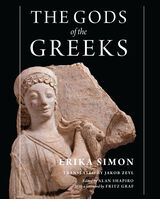
The Gods of the Greeks
Erika Simon, Translated by Jakob Zeyl, Edited by Alan Shapiro
University of Wisconsin Press, 2021
Originally published in Germany fifty years ago, The Gods of the Greeks has remained an enduring work. Influential scholar Erika Simon was one of the first to emphasize the importance of analyzing visual culture alongside literature to better understand how ancient Greeks perceived their gods. Giving due consideration to cult ritual and the phenomenon of genealogical relationships between mortals and immortals, this pioneering volume remains one of the few to approach the Greek gods from an archaeological perspective. From Zeus to Hermes, each of the major deities is considered in turn, with Simon’s insights on their nature and attributes guiding the reader to a fuller understanding of how their followers perceived and worshipped them in the ancient world.
This careful and fluid translation finally makes Simon’s landmark edition accessible to English-language readers. With an abundance of beautiful illustrations, the book examines portrayals of the thirteen major gods in art over the course of two millennia. Scholars who study the lives and practices of those living in ancient Greece will value this newest contribution.
This careful and fluid translation finally makes Simon’s landmark edition accessible to English-language readers. With an abundance of beautiful illustrations, the book examines portrayals of the thirteen major gods in art over the course of two millennia. Scholars who study the lives and practices of those living in ancient Greece will value this newest contribution.
[more]
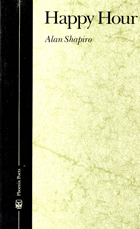
Happy Hour
Alan Shapiro
University of Chicago Press, 1987
"Within his deliberately narrowed range Mr. Shapiro has cultivated a new generosity of detail and insight. This is especially important in the longer poems here, narratives of considerable power. They may seem more like versified short stories than poems, but their skill and force are moving."—J. D. McClatchy, New York Times Book Review
"Happy Hour is one of the best collections I have recently read. Mr. Shapiro writes with apparently equal ease in free verse and more nearly traditional forms, and he brings his formidable technical skills to bear upon matters of great urgency: our need to love and be loved, and the often perverse ways in which we maintain our connections to those closest to us."—Henry Taylor, Washington Times
"This is a haunting, mature collection that should attract a larger audience for Shapiro's fine poems."—Thomas Swiss, Chicago Tribune
"Happy Hour is one of the best collections I have recently read. Mr. Shapiro writes with apparently equal ease in free verse and more nearly traditional forms, and he brings his formidable technical skills to bear upon matters of great urgency: our need to love and be loved, and the often perverse ways in which we maintain our connections to those closest to us."—Henry Taylor, Washington Times
"This is a haunting, mature collection that should attract a larger audience for Shapiro's fine poems."—Thomas Swiss, Chicago Tribune
[more]
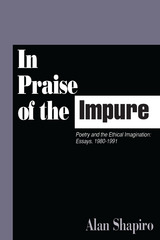
In Praise of the Impure
Poetry and the Ethical Imagination: Essays, 1980-1991
Alan Shapiro
Northwestern University Press, 1993
Alan Shapiro is not only a much-lauded poet but also one of America's most intelligent and clearheaded thinkers about poetry. In Praise of the Impure collects his passionate, rigorously argued essays on the situation of poetry in American culture today.
[more]
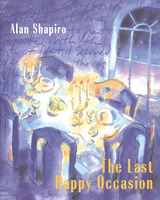
The Last Happy Occasion
Alan Shapiro
University of Chicago Press, 1996
The Last Happy Occasion is the coming-of-age story of an American Jew and aspiring writer in the sixties and seventies. In this memoir in six movements, Alan Shapiro recalls how poetry helped him make sense of his own and other people's lives. Events unfold, including his sister's death, that make him reconsider the transformative power of art and accept the limitations of poetry in confronting the untransformable pain of mortal loss.
A refreshingly honest, lovingly crafted work, The Last Happy Occasion is a treasure map for anyone interested in exploring the intersections of life and art.
A refreshingly honest, lovingly crafted work, The Last Happy Occasion is a treasure map for anyone interested in exploring the intersections of life and art.
Nominated for the 1996 National Book Critics Circle Award.
"[Shapiro] seeks what lies at the deepest level of the human heart to mitigate his—and our—separateness from others."—Chase Collins, Chicago Tribune Books
"The Last Happy Occasion is touching and intelligent, emotionally satisfying and eloquent testimony to the power of poetry to instruct, heal and inspire."—Emily Barton, New York Times Book Review
"Shapiro, not unlike Auden, doses his wordplay with a certain sly irony. . . . We come away from Shapiro's book with an intimate appreciation of the little subversions that poetry can work in one's life."—Jonathan Kirsch, Los Angeles Times
"He is an acute observer of moments, people, art and language. And he packs even seemingly simple stories with many layers of meaning. . . . He shows us the power and importance of transformative art in life."—Publishers Weekly, starred review
"The Last Happy Occasion is touching and intelligent, emotionally satisfying and eloquent testimony to the power of poetry to instruct, heal and inspire."—Emily Barton, New York Times Book Review
"Shapiro, not unlike Auden, doses his wordplay with a certain sly irony. . . . We come away from Shapiro's book with an intimate appreciation of the little subversions that poetry can work in one's life."—Jonathan Kirsch, Los Angeles Times
"He is an acute observer of moments, people, art and language. And he packs even seemingly simple stories with many layers of meaning. . . . He shows us the power and importance of transformative art in life."—Publishers Weekly, starred review
"The literary criticism is sharp, but what enthralls the reader more is Shapiro's humorous but honest perspective on his younger self, a perspective that is critical without being condescending."—Heller McAlpin, Newsday
[more]

Life Pig
Alan Shapiro
University of Chicago Press, 2016
From Let Me Hear You
Outside is inside now.
The pyramid whose point
we are is weightless
and invisible
and has become itself the night
in which alone
together
on a high plateau
we go on shouting
out whatever name
those winds keep blowing back
into the mouth that’s shouting it.
Alan Shapiro’s newest book of poetry is situated at the intersection between private and public history, as well as individual life and the collective life of middle-class America in the twentieth and twenty-first centuries. Whether writing about an aged and dying parent or remembering incidents from childhood and adolescence, Shapiro attends to the world in ways that are as deeply personal as they are recognizable and freshly social—both timeless and utterly of this particular moment.
Outside is inside now.
The pyramid whose point
we are is weightless
and invisible
and has become itself the night
in which alone
together
on a high plateau
we go on shouting
out whatever name
those winds keep blowing back
into the mouth that’s shouting it.
Alan Shapiro’s newest book of poetry is situated at the intersection between private and public history, as well as individual life and the collective life of middle-class America in the twentieth and twenty-first centuries. Whether writing about an aged and dying parent or remembering incidents from childhood and adolescence, Shapiro attends to the world in ways that are as deeply personal as they are recognizable and freshly social—both timeless and utterly of this particular moment.
[more]
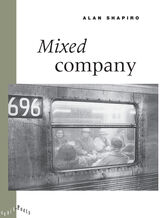
Mixed Company
Alan Shapiro
University of Chicago Press, 1996
Respected poet, teacher, and critic Alan Shapiro continues his much-acclaimed explorations of childhood, family, and marriage in Mixed Company. Revealing a world troubled by difference while struggling toward commonality, and with equal attention to historical detail and the poetics of everyday life, from the mythic past to the abrasive intimacies of the present, Shapiro charts the many ways our social and sexual identities are formed, threatened, altered, and, for good or ill, preserved. Deeply felt and ambitious, Mixed Company is an extraordinary book by one of the leading poets writing in America today.
"What draws us into Alan Shapiro's Mixed Company is not a conspicuous felicity or any sort of bravura, but the quiet, undaunted way he goes after the truth of human feeling and motive. . . . The poems grope and conjecture, looking for understanding . . . but whatever may remain unsolved and insoluble, the poems are full of astonishing insights, a rare articulateness, and what another age called 'knowledge of the human heart.'" —Richard Wilbur
"What draws us into Alan Shapiro's Mixed Company is not a conspicuous felicity or any sort of bravura, but the quiet, undaunted way he goes after the truth of human feeling and motive. . . . The poems grope and conjecture, looking for understanding . . . but whatever may remain unsolved and insoluble, the poems are full of astonishing insights, a rare articulateness, and what another age called 'knowledge of the human heart.'" —Richard Wilbur
[more]
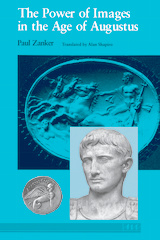
The Power of Images in the Age of Augustus
Paul Zanker; translated by Alan Shapiro
University of Michigan Press, 1990
"Art and architecture are mirrors of a society. They reflect the state of its values, especially in times of crisis or transition." Upon this premise Paul Zanker builds an interpretation of Augustan art as a visual language that both expressed and furthered the transformation of Roman society during the rule of Augustus Caesar. The Power of Images in the Age of Augustus illustrates how the establishment of monarchy under Augustus Caesar led to the creation of a new system of visual imagery that reflects the consciousness of this transitional age.
[more]
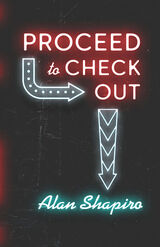
Proceed to Check Out
Alan Shapiro
University of Chicago Press, 2022
Award-winning poet Alan Shapiro offers a new collection of poems reflecting on mortality and finitude.
Alan Shapiro’s fourteenth collection of poetry, Proceed to Check Out, is a kind of summing up, or stock-taking, by an aging poet, of his precarious place in a world dominated by the ever-accelerating pace of technological innovation, political disruption, personal loss, and racial strife. These poems take on fundamental subjects—like the nature of time and consciousness and how or why we become who we are—but Shapiro presses them into becoming urgent and timely.
Employing idiomatic range and formal variety, Shapiro’s poems move through recurring dreams, the coercions of childhood, and the mysterious connections of mind and matter, pleasure and memory. They meet an abiding need to find empathy and understanding in even the most challenging places—amid disaffection, public discord, and estrangement. His grasp of contemporary life—in all its insidious violence and beauty—is distinct, comprehensive, and profound.
Alan Shapiro’s fourteenth collection of poetry, Proceed to Check Out, is a kind of summing up, or stock-taking, by an aging poet, of his precarious place in a world dominated by the ever-accelerating pace of technological innovation, political disruption, personal loss, and racial strife. These poems take on fundamental subjects—like the nature of time and consciousness and how or why we become who we are—but Shapiro presses them into becoming urgent and timely.
Employing idiomatic range and formal variety, Shapiro’s poems move through recurring dreams, the coercions of childhood, and the mysterious connections of mind and matter, pleasure and memory. They meet an abiding need to find empathy and understanding in even the most challenging places—amid disaffection, public discord, and estrangement. His grasp of contemporary life—in all its insidious violence and beauty—is distinct, comprehensive, and profound.
[more]
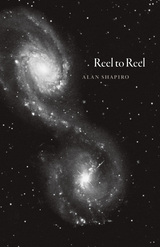
Reel to Reel
Alan Shapiro
University of Chicago Press, 2014
Reel to Reel, Alan Shapiro’s twelfth collection of poetry, moves outward from the intimate spaces of family and romantic life to embrace not only the human realm of politics and culture but also the natural world, and even the outer spaces of the cosmos itself. In language richly nuanced yet accessible, these poems inhabit and explore fundamental questions of existence, such as time, mortality, consciousness, and matter. How did we get here? Why is there something rather than nothing? How do we live fully and lovingly as conscious creatures in an unconscious universe with no ultimate purpose or destination beyond returning to the abyss that spawned us? Shapiro brings his humor, imaginative intensity, characteristic syntactical energy, and generous heart to bear on these ultimate mysteries. In ways few poets have done, he writes from a premodern, primal sense of wonder about our postmodern world.
[more]
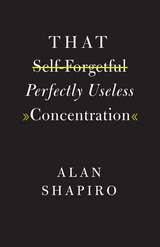
That Self-Forgetful Perfectly Useless Concentration
Alan Shapiro
University of Chicago Press, 2016
More than a gathering of essays, That Self-Forgetful Perfectly Useless Concentration is part memoir, part literary criticism, and an artful fusion of the two. It is an intimate portrait of a life in poetry that only Alan Shapiro could have written.
In this book, Shapiro brings his characteristic warmth, humor, and many years as both poet and teacher to bear on questions surrounding two preoccupations: the role of conventions—of literary and social norms—in how we fashion our identities on and off the page, and how suffering both requires and resists self-expression. He sketches affectionate portraits of his early teachers, revisits the deaths of his brother and sister, and examines poems that have helped him navigate troubled times. Integrating storytelling and literary analysis so seamlessly that art and life become extensions of each other, Shapiro embodies in his lively prose the very qualities he celebrates in the poems he loves.
Brimming with wit and insight, this is a book for poets, students and scholars of poetry, teachers of literature, and everyone who cares about the literary arts and how they illuminate our personal and public lives.
In this book, Shapiro brings his characteristic warmth, humor, and many years as both poet and teacher to bear on questions surrounding two preoccupations: the role of conventions—of literary and social norms—in how we fashion our identities on and off the page, and how suffering both requires and resists self-expression. He sketches affectionate portraits of his early teachers, revisits the deaths of his brother and sister, and examines poems that have helped him navigate troubled times. Integrating storytelling and literary analysis so seamlessly that art and life become extensions of each other, Shapiro embodies in his lively prose the very qualities he celebrates in the poems he loves.
Brimming with wit and insight, this is a book for poets, students and scholars of poetry, teachers of literature, and everyone who cares about the literary arts and how they illuminate our personal and public lives.
[more]
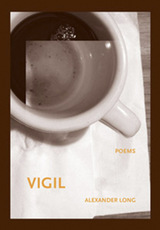
Vigil
Alan Shapiro
University of Chicago Press, 1997
The New York Times Book Review praised Alan Shapiro's The Last Happy Occasion as a "touching and intelligent, emotionally satisfying and elegant testimony to the power of poetry to instruct, heal and inspire." Vigi emerges from the final chapter of that book, "Sittin' in a Funeral Place," a powerful essay about Shapiro's sister Beth, her struggle with breast cancer, and the limitations of poetry in confronting the untransformable pain of loss.
In Vigil, Shapiro chronicles with heart-wrenching lyricism the final four weeks of Beth's life in a hospice, attended by her parents, brothers, husband, daughter and friends. One by one, as loved ones arrive to visit Beth, Shapiro reveals fragments of their personal history, bringing to life a troubled and poignant past. A visit from their brother David triggers the memory of a searing betrayal—the parents disowned Beth after learning from David that she was secretly dating a black man; a visit from the parents recalls their bitter quarrels over Beth's radical politics; a visit from Beth's black husband brings the painful memory of their wedding and her parents' refusal to attend. These recollections and feelings that surface with each visit evoke the unresolved, deeply disturbing issues that kept the Shapiro family estranged for so long, making the reconciliation that Beth's death brings to her family all the more extraordinary.
Shapiro gives an unconventionally honest account of our responses—horror, relief, impatience, exhaustion, exhilaration, projection, fear, self-criticism, and a sense of fulfillment—in the presence of the dying. Concluding with a selection of moving poems, Shapiro affirms the astonishing link between creativity and healing, and provides a coda to the whole experience. The price of human connection may be great, but human connection, in the end, has the power to redeem even the most painful of human experiences.
In Vigil, Shapiro chronicles with heart-wrenching lyricism the final four weeks of Beth's life in a hospice, attended by her parents, brothers, husband, daughter and friends. One by one, as loved ones arrive to visit Beth, Shapiro reveals fragments of their personal history, bringing to life a troubled and poignant past. A visit from their brother David triggers the memory of a searing betrayal—the parents disowned Beth after learning from David that she was secretly dating a black man; a visit from the parents recalls their bitter quarrels over Beth's radical politics; a visit from Beth's black husband brings the painful memory of their wedding and her parents' refusal to attend. These recollections and feelings that surface with each visit evoke the unresolved, deeply disturbing issues that kept the Shapiro family estranged for so long, making the reconciliation that Beth's death brings to her family all the more extraordinary.
Shapiro gives an unconventionally honest account of our responses—horror, relief, impatience, exhaustion, exhilaration, projection, fear, self-criticism, and a sense of fulfillment—in the presence of the dying. Concluding with a selection of moving poems, Shapiro affirms the astonishing link between creativity and healing, and provides a coda to the whole experience. The price of human connection may be great, but human connection, in the end, has the power to redeem even the most painful of human experiences.
[more]
READERS
Browse our collection.
PUBLISHERS
See BiblioVault's publisher services.
STUDENT SERVICES
Files for college accessibility offices.
UChicago Accessibility Resources
home | accessibility | search | about | contact us
BiblioVault ® 2001 - 2024
The University of Chicago Press






